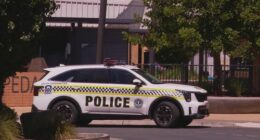Share this @internewscast.com
A device that uses nanoscopic needles to inject or extract a sample from a living cell has been hailed as a breakthrough for cancer research.
Techniques used to study single cells usually destroy them but the “nanopipette” allows researchers to extract tiny samples from a living cell without killing it.
This will enable them to study the same tumour cells before, during and after cancer treatment.
Dr Lucy Stead, associate professor of brain cancer biology at the University of Leeds, where the device was developed, said: “This is a significant breakthrough.
“It is the first time that we have a technology where we can actually monitor the changes taking place after treatment, rather than just assume them.
“This type of technology is going to provide a layer of understanding that we have simply never had before. And that new understanding and insight will lead to new weapons in our armoury against all types of cancer.”
The tool has two tiny needles that can simultaneously inject and extract a sample from a single cell.
It is too small to be manipulated by hand so the minuscule needles are precisely controlled by robotic software.
The Leeds team used the device to study glioblastoma (GBM) – the deadliest form of brain cancer – cells over 72 hours.
Around 3,200 people are diagnosed with GBM each year in the UK and it is incurable.
GBM cells are particularly “plastic” and can adapt quickly, which helps them develop resistance to radiotherapy and chemotherapy.
However, the scientists found that the cells they observed actually became more stable and less plastic immediately after treatment.
This suggests they may enter a period of stability before they return to plasticity – which could present a window of opportunity to find ways to kill them.
The tool will also allow the researchers to pinpoint and sample cells that are not killed by chemotherapy, which lead to cancer growing back.
Learning how to block tumours’ adaptation could help prevent cancers recurring, it is hoped.
Dr Stead added: “It is so important that we can dynamically observe and characterise these cells as they change, so we can map out the journey these cells can take, and subsequently find ways to stop them at every turn.
“This technology could be transformative for this particular cancer, helping us finally identify effective treatments for this awful, incurable disease.”
Dr Simon Newman, chief scientific officer at The Brain Tumour Charity, said: “The development of this novel technology, which can extract samples from tumour cells grown in the lab before and after treatment, will give a unique insight into how drug resistance may develop and lead to tumours growing back.
“We hope that this important work, funded by The Brain Tumour Charity, will improve our knowledge of these complex brain tumours and allow us to find new, more effective treatments – something so urgently needed for those faced with this devastating disease.”
The findings were published in the journal Science Advances.










